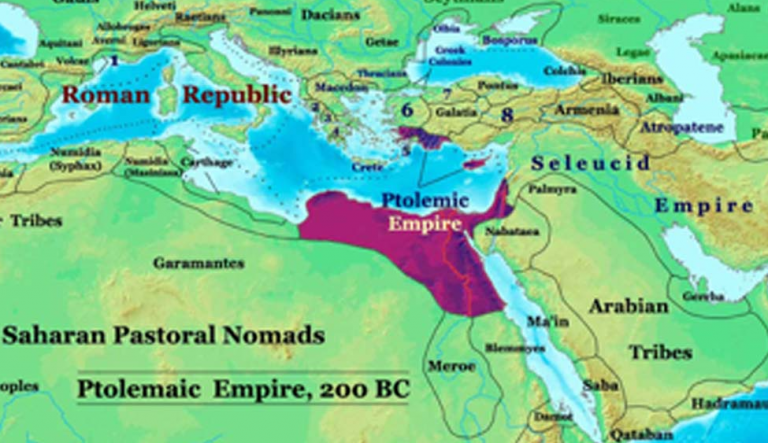Ptolemaic Egypt is distinctive in being both the last independent Egyptian dynasty and the last Hellenistic kingdom to fall to Rome. The Ptolemies were not native Egyptians, but Greek by descent.
Nonetheless, they preserved many of the traditions of the ancient Egyptians. It was also a major Hellenistic cultural center which set the pattern for other Hellenistic kingdoms to follow.
Rise of the Ptolemies
Alexander the Great (356-323 BC) liberated Egypt from the Persians in the autumn of 332 BC. During his stay in Egypt, he also founded the legendary city of Alexandria at the location of the formerly unimportant Egyptian town of Rhakotis.
After Alexander’s death in 323 BC, his empire was divided between his generals. A Macedonian general by the name of Ptolemy, who had been with Alexander in Egypt, declared himself satrap of Egypt.
He ruled as satrap until 305 BC, when he declared himself king of Egypt as Ptolemy I Soter. His epithet, which means savior, comes from his reputation for having saved the people of Rhodes from a siege in 315 BC.
The Golden Age of Ptolemaic Egypt (305-145 BC)
During his reign, Ptolemy I Soter expanded the holdings of Egypt, creating an overseas empire that included Cypress and Cyrene. He and the king of the Seleucids also contested for control of the Levant. It is also during the reign of Ptolemy I that the Great Library of Alexandria was established.
The Great Library was established by Demetrius of Phaleron, a former student of the Peripatetic school, Aristotle’s famous school. After an aborted political career in Athens, Demetrius emigrated to Egypt where he was able to find a job in the court of Ptolemy I.
The Hellenistic king was interested in increasing his prestige by making his realm famous for intellectual learning. The library was envisioned as being not just an ordinary library, but a universal library containing all knowledge in the known world, at the time.
This ambition was in keeping with the reverence that the Greeks and other ancient Mediterranean cultures had for knowledge as well as the goals of Alexander the Great. He wanted to gain as much knowledge from the lands that he conquered as possible.
The Library of Alexandria was established around 295 BC and served as a massive collection of writings, containing books from across the ancient world. The library existed within the palace complex and was under direct control of the king. There was also a research institution, the Musaeum, attached to it which consisted of scholars who were given the task of studying all the knowledge brought to the Great Library.
These scholars both lived and worked within the grounds of the Great Library and the Musaeum. The scholars known to have been in residence include luminaries such as Archimedes, Euclid, the founder of Western geometry, Eratosthenes, the first Greek mathematician to calculate the circumference of the earth, and the great astronomer Claudius Ptolemy who published the astronomical treatise, the Almagest. At its height, the Great Library is said to have had as many as 700,000 scrolls.
In 285 BC, Ptolemy I was succeeded by his son, Ptolemy II Philadelphus. Ptolemy II is known for having increased the prestige of Alexandria by establishing a festival, the Ptolemaieia, which was supposed to be on par with the Olympic Games in prestige. It consisted of a series of floats depicting various religious traditions in the city.
Ptolemy II also is known for having been engaged in a number of conflicts with the Seleucid kings. During his reign, Egypt became one of the wealthiest and most powerful of the Hellenistic kingdoms. A Ptolemaic empire emerged across the lands of the eastern Mediterranean.
Another custom attributed to Ptolemy II is brother-sister marriage among the Ptolemaic monarchs. He married his full sister Arsinoe II and they both took the same epithet, Philodelphus, which essentially means ‘sibling-loving’. This practice was soon imitated by common Egyptians.
In 246 BC, Ptolemy II Philadelphus was succeeded by Ptolemy III Euergetes who governed from 246 BC to 221 BC. His reign was marked by conflict with the Seleucids. Ptolemy III Euergetes went to war with the Seleucids after the murder of his sister Berenice, who had been married to Antiochus II.
After a successful invasion of Syria, he returned statues to Egypt which had been stolen by the Persians. This made him very popular among native Egyptians. This event was recorded in the Decree of Canopus in 238 BC.
The king succeeding him was Ptolemy IV Philopator who was considered by Greek historians to be a weak ruler who was easily manipulated by Alexandrian officials. Nonetheless, Egypt did experience a major victory during his reign at the Battle of Raphia.
The Battle of Raphia took place in 217 BC in southern Palestine and was a decisive victory over the Seleucids. It was also notable for the involvement of native Egyptian soldiers fighting alongside soldiers of Greek descent.
The Decline of Ptolemaic Egypt
By the end of the 3rd century BC, Ptolemaic Egypt had lost most of its overseas territories. This may have been partly due to problems arising at home. Native Egyptian regiments had played an important role in the victory at the Battle of Raphia and this made the Egyptians realize their potential and encouraged native revolts across the southern part of the kingdom.
Read more HERE
Ask me anything
Explore related questions





